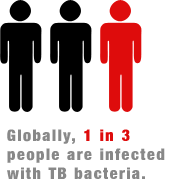
Want a better test for TB infection?
Then you want a TB blood test! The TB blood test is more specific than a TB skin test (less likely to cause a false positive) and it requires only one visit, while a TB skin test may require several visits (four visits over a 10 to 21 day period for a two-step test).
TB blood tests (also called interferon-gamma release assays or IGRAs) measure how the immune system reacts to the bacteria that cause TB. An IGRA is a laboratory test that measures how strongly a person's immune system reacts to TB bacteria.
Two IGRAs are approved by the U.S. Food and Drug Administration (FDA) and are available in the United States:
- QuantiFERON®-TB Gold In-Tube test (QFT-GIT)
- T-SPOT® TB test (T-Spot)
Two types of TB blood test results are possible:
- Positive IGRA: This means that the person has been infected with TB bacteria. Additional tests are needed to determine whether the person has TB infection or TB disease. A health care worker will then provide treatment as needed.
- Negative IGRA: This means that the person's blood did not react to the test and that TB infection or TB disease is not likely.
IGRAs are the preferred method of testing for TB infection. It should be the only test considered for:
- People who have, or may have, received bacille Calmette-Guérin (BCG). BCG is sometimes used in the U.S. as a treatment for some forms of cancer or as a vaccine for TB disease in some high-risk countries.
- People who have a difficult time returning to have a skin test read.
IGRAs can be safely repeated.

